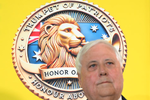- Joined
- 3 July 2009
- Posts
- 28,137
- Reactions
- 25,363
New Zealanders re locating here, in record numbers.

 www.theage.com.au
www.theage.com.au
“Ditch the winter chill” and “expand your horizons in sunny South East Queensland!” reads one newspaper advert, luring New Zealand’s healthcare workers towards a new life in Australia. “Warmer days and higher pays”, enthused another, last year, from the Australian state’s police service. Kiwis who chose “policing in paradise” could look forward to 300 days of annual sunshine and a $20,000 relocation bonus, it declared.
For many New Zealanders, that is an easy sell. They are leaving their country in record numbers. Almost 129,000 residents emigrated last year – 40 per cent above the pre-pandemic average for this century. It is not a case of last in, first out. Most of those leaving were New Zealanders, rather than immigrants returning home, creating a net loss of 47,000 citizens.
Emigration ebbs and flows: the last spike occurred in 2012, near the end of the financial crisis. As the pandemic raged, many expats returned to hunker behind closed borders, but the outflow quickly resumed. Recently, New Zealand has been in a rut. The economy is in recession and unemployment has risen. Outgoing Kiwis grumble about costly housing and a crime surge.
Unlike most, they have an alternative when times get tough: they are free to live and work in Australia, and vice versa. Almost 15 per cent of them are now based “across the ditch”.
It is not just that Australia’s economy has weathered the cost-of-living crisis better. The income gap between the pair has been growing for decades. Adjusted for purchasing power, Australia’s per person GDP is about a third higher than New Zealand’s. Its pensions are more generous, and its centre-left Labor government has made it easier for Kiwis to get passports and benefits
Why New Zealanders are migrating to Australia in record numbers
The government may not be able to reverse the trend, which one Kiwi describes as abandoning “a sinking boat”.
“Ditch the winter chill” and “expand your horizons in sunny South East Queensland!” reads one newspaper advert, luring New Zealand’s healthcare workers towards a new life in Australia. “Warmer days and higher pays”, enthused another, last year, from the Australian state’s police service. Kiwis who chose “policing in paradise” could look forward to 300 days of annual sunshine and a $20,000 relocation bonus, it declared.
For many New Zealanders, that is an easy sell. They are leaving their country in record numbers. Almost 129,000 residents emigrated last year – 40 per cent above the pre-pandemic average for this century. It is not a case of last in, first out. Most of those leaving were New Zealanders, rather than immigrants returning home, creating a net loss of 47,000 citizens.
Emigration ebbs and flows: the last spike occurred in 2012, near the end of the financial crisis. As the pandemic raged, many expats returned to hunker behind closed borders, but the outflow quickly resumed. Recently, New Zealand has been in a rut. The economy is in recession and unemployment has risen. Outgoing Kiwis grumble about costly housing and a crime surge.
Unlike most, they have an alternative when times get tough: they are free to live and work in Australia, and vice versa. Almost 15 per cent of them are now based “across the ditch”.
It is not just that Australia’s economy has weathered the cost-of-living crisis better. The income gap between the pair has been growing for decades. Adjusted for purchasing power, Australia’s per person GDP is about a third higher than New Zealand’s. Its pensions are more generous, and its centre-left Labor government has made it easier for Kiwis to get passports and benefits




